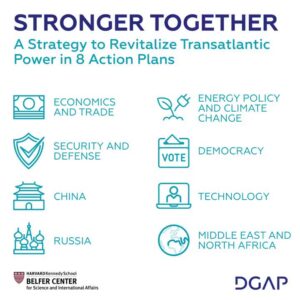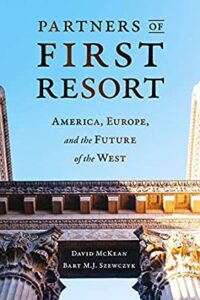 India and Pakistan are in. Turkey and Hungary are not. That’s the still-tentative plan, anyway, as the White House has begun to send out invitations for the forthcoming “Summit for Democracy,” POLITICO reports:
India and Pakistan are in. Turkey and Hungary are not. That’s the still-tentative plan, anyway, as the White House has begun to send out invitations for the forthcoming “Summit for Democracy,” POLITICO reports:
- The goal is to be more, rather than less, inclusive. But U.S. officials drew the line at places like Turkey and Hungary, which have drifted far from democratic rule.
- A hefty interagency process led to the invite list, but it’s still possible that another round will get sent out depending on the initial reaction.
- U.S. strategic considerations played a role. That’s likely why an invitation was sent to a country like India, where there are concerns about democratic backsliding but which Biden considers a key ally on countering China.
“What we’re trying to do through the Summit for Democracy is to galvanize democratic renewal worldwide,” said a senior administration official, speaking on background on the condition of anonymity. “Because of that, we’re seeking a really inclusive, big-tent approach,” the official told Foreign Policy’s Amy Mackinnon, a former NED Penn Kemble fellow.
Meanwhile, authoritarian ideologists are becoming more confident and outspoken.
 “When an ‘authoritarian state’ such as China overtakes the US to become the world’s largest economy in terms of gross domestic product in around 2030, the influence of Western democracy will be looking at its nadir,” said Zhou Bo, Senior Fellow at Tsinghua University’s Centre for International Security and Strategy.
“When an ‘authoritarian state’ such as China overtakes the US to become the world’s largest economy in terms of gross domestic product in around 2030, the influence of Western democracy will be looking at its nadir,” said Zhou Bo, Senior Fellow at Tsinghua University’s Centre for International Security and Strategy.
“Mali is ranked as ‘Free’ by Freedom House, but is a Least Developed Country. Qatar has arguably the highest GDP per capita in the world, but has never been democratic,” he told this week’s 8th Annual meeting of the Putinesque Valdai Discussion Club. “Which of the two countries has delivered more to its own people? And if a country fails to meet the basic needs of its own people, is democracy, as such, still desirable?”
Furthermore, the West’s democracies remain divided over appropriate strategies for confronting resurgent authoritarians, a leading commentator observes.
 For the first time since the end of World War II, the U.S. faces a struggle on two fronts, the Brookings Institution’s William Galston notes. It is the most powerful member of a long-established trans-Atlantic alliance to contain and deter Russia, and also of a gathering alliance to prevent China from dominating the Pacific. What happens in one will affect the other, in no small measure because American power is central to both. Europe’s stance on Pacific issues will have repercussions for trans-Atlantic concerns, he writes for the Wall Street Journal.
For the first time since the end of World War II, the U.S. faces a struggle on two fronts, the Brookings Institution’s William Galston notes. It is the most powerful member of a long-established trans-Atlantic alliance to contain and deter Russia, and also of a gathering alliance to prevent China from dominating the Pacific. What happens in one will affect the other, in no small measure because American power is central to both. Europe’s stance on Pacific issues will have repercussions for trans-Atlantic concerns, he writes for the Wall Street Journal.
This new reality shapes the difficulties the trans-Atlantic alliance now faces. The U.S. and Europe cannot stand shoulder to shoulder unless they agree on the threats that democracies now confront. But in too many areas, they don’t, adds Galston, a former National Endowment for Democracy (NED) board member:
Meanwhile, China is playing a long game to increase its influence throughout Europe. State-owned Chinese firms hold substantial stakes in more than a dozen European ports. One of these firms enjoys operating control of the Greek port of Piraeus until at least 2052 and has invested nearly $1 billion to upgrade the port’s facilities. Is it a coincidence that Greece in 2017 blocked an EU resolution condemning China’s crackdown on pro-democracy dissidents, calling the criticism of China “unconstructive”?
 The problems in the internal workings of democratic institutions and societies should not be underplayed, according to a World Economic Forum analysis. But ultimately, domestic discontent, internal contestation, and sometimes even extreme protests are the stuff that democracies are made of.
The problems in the internal workings of democratic institutions and societies should not be underplayed, according to a World Economic Forum analysis. But ultimately, domestic discontent, internal contestation, and sometimes even extreme protests are the stuff that democracies are made of.
By contrast, the external risks that democracies face today from systemic rivals – especially in an age of “weaponized interdependence” – are potentially existential, notes Amrita Narlikar, President of the German Institute for Global and Area Studies (GIGA). An agenda for democratic renewal will be in vain, unless these external threats are recognized, and addressed through restructured supply chains, new global partnerships, and reinvigorated alliances.
NATO allies on its Baltic front lines fear that Russia and Belarus are exploiting the flow of thousands of migrants into the European Union (EU)—perhaps even as cover for their agents—to infiltrate and destabilize Western democracies, and threaten exiled dissidents, Newsweek reports:
These states on the very edges of NATO’s defensive alliance are grappling with what they call a new strain of Russian-Belarusian hybrid warfare as Moscow and Minsk weaponize some of the most vulnerable people in Europe. Since August, Latvia, Lithuania, Estonia, and Poland have faced a surge in new arrivals—notably from Iraq, Afghanistan, and sub-Saharan Africa—at their borders, which they say Belarus is facilitating with the support of its ally Russia.
 There is no better place than the forthcoming “Summit for Democracy” for Western democracies to start making accountable the tax evaders, kleptocrats and enablers exposed in the Pandora Papers, writes Frank Vogl, an adjunct professor at Georgetown University, co-founder of Transparency International and the author of the forthcoming book, The Enablers: How the West Supports Kleptocrats and Corruption – Endangering Our Democracy.
There is no better place than the forthcoming “Summit for Democracy” for Western democracies to start making accountable the tax evaders, kleptocrats and enablers exposed in the Pandora Papers, writes Frank Vogl, an adjunct professor at Georgetown University, co-founder of Transparency International and the author of the forthcoming book, The Enablers: How the West Supports Kleptocrats and Corruption – Endangering Our Democracy.
Due to the complexity of global politics and dwindling American power, allies have become indispensable to amplifying its soft and hard power. The snag is that to do so Washington needs to involve them in decision-making, adds analyst Joergen Oerstroem Moeller. Biden’s strategy is marketed as democracies-vs-authoritarians – a commendable objective, but many around the globe question the credibility or legitimacy of U.S. leadership, he writes for the National Interest.
Three external risks to democracy and how to address them https://t.co/AMGrbIg95u via @wef
— Democracy Digest (@demdigest) October 20, 2021







